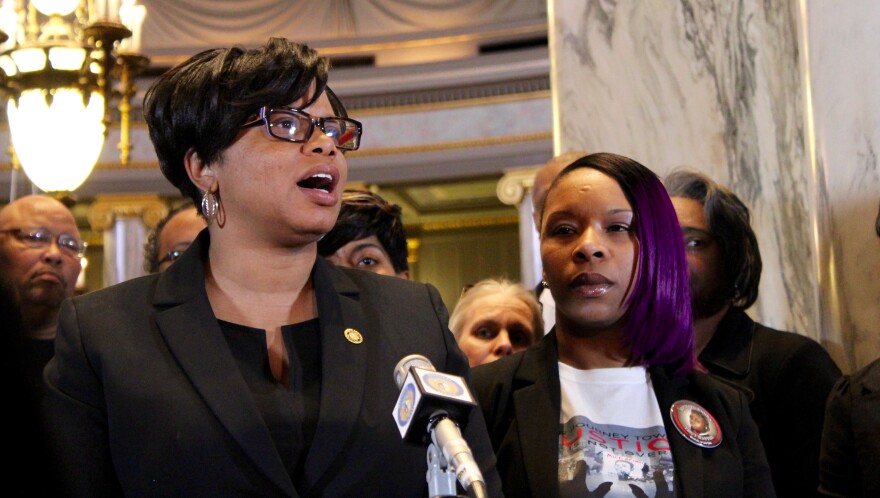When then-Ferguson Police officer Darren Wilson shot and killed Michael Brown, the policeman wasn’t wearing a body camera. And the uncertainty that followed provided a spark of sorts for programs to help law enforcement get the devices.
But Missouri did not pass legislation last year that would assist local police departments pay for body cameras – and provide guidelines for when footage is released. On Wednesday the issue returned with lawmakers receiving encouragement from Lesley McSpadden, the mother of Michael Brown.
“It would have given me the truth. It would have answered a lot of unanswered questions,” McSpadden said. “And as far as the privacy issue or the money issue, neither of the two is greater than saving a life. Neither.”
McSpadden testified before a Senate committee in favor of Sen. Jamilah Nasheed’s body camera legislation. As introduced, the bill would require large cities like St. Louis and Kansas City to provide officers with body cameras and set up a state mechanism to help pay for the devices. (Nasheed said those funds would be subject to appropriation.)
Additionally, the bill would require law enforcement agencies to retain body camera footage for two years. It would make the footage open records in the same manner as incident reports.
Nasheed said many aspects of the bill may likely change. But she added that it’s time for Missouri to act, especially since relatively conservative states such as Texas and South Carolina have passed bills that support body cameras.
“Now is the time to show the nation that we’re listening to the cries of the people who were on the forefront in Ferguson during the unrest,” Nasheed said. “We’re listening and we’re ready to step up to the plate and do something that is of great significance to the state of Missouri.”
The cost of transparency
Supporters of the bill told members of the Senate Transportation Committee that body cameras are just one aspect of the conversation on police accountability and transparency.

"Body cameras are not a substitute for good policies, good training, or good community policing programs," said McSpadden. "It is important for police departments to make sure new hires participate in cultural sensitivity training. Training that will help teach police officers how to bridge the gap between communities and themselves."
Some advocated for third-party storage of the videos to ensure law enforcement wouldn't be able to tamper with sensitive evidence. But others who testified said they believe body cameras would help police just as much as the community.
"There will be videos of whatever goes on out there," said Tom Utterbach, a retired lawyer and resident of St. Louis. "The proliferation of cell phones is going to continue, it's going to intensify. ... So, your choice is not that there will be no videos. There will be. Your choice is whether or not we can begin the process to put this very good police technology into the hands of the authorities."
The St. Louis Metropolitan Police Department started a pilot program that gave body cameras to some of its officers. But Nasheed said the cost is preventing the department from expanding to its entire force.
“I’m going for all of the funding,” Nasheed said. “I truly believe at the end of the day -- we have a $26 billion budget -- if we can get tax cuts for a ballpark stadium, surely we can find funding.”
Chairman of the Senate Transportation Committee, Sen. Doug Libla, R-Poplar Bluff, said he is open to discussing more aspects of the bill.
"There was a lot of information provided on the implementation to this plan," said Libla. "What happens when a police officer is off duty? What happens to a police officer if he happens to forget to turn his cam on? What kind of technology is there?"
Sen. Nasheed made it clear that she's willing to work with legislators, police departments and citizens to ensure this bill makes it to the governor's desk during this legislative session.
"I think the main opposition is ignorance," said Nasheed. "We have to let [our colleagues] know that this is not an attack on law enforcement."





